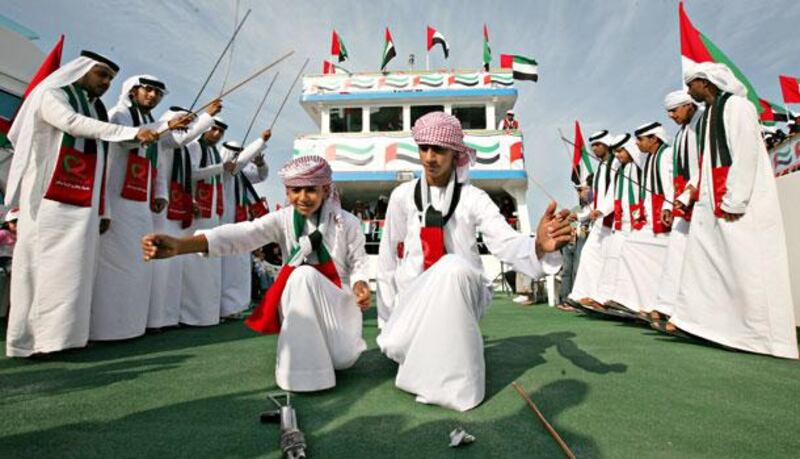Gulf states, including the UAE, have a role to play in improving mutual understanding between Islam and the West, according to the majority of westerners answering surveys to mark National Day. The finding emerged from parallel surveys carried out in five countries for The National by YouGov, the international research organisation, designed to gauge how the world sees the UAE on the 38th anniversary of the nation.
The survey was administered to 2,049 people in the UK, and to smaller samples in the US, Egypt, Saudi Arabia and India. When asked the question: "Do you believe that Arabian Gulf states such as the UAE have a role to play in improving mutual understanding between Islam and the West?" 60 per cent of the UK sample and 70 per cent of the 229 respondents in the US answered "yes", while 35 per cent in the UK and 20 per cent in the US said they did not know enough about the region to judge.
The survey did not elaborate on what specific conciliatory role the Gulf states might play. Respondents in the UK felt that, after Saudi Arabia, the UAE was the most influential country in the Middle East and North Africa, followed by Egypt, Kuwait, Syria and Qatar. But the surveys also revealed some ignorance about the UAE's position on the geopolitical landscape. Offered a choice of 13 possible partners with which the UAE might have a political affinity, 41 per cent in the UK and 34 per cent in the US were unable to select even one, simply responding "don't know" to the question.
Although 28 per cent in the UK, but only 17 per cent in the US, correctly identified the UAE's association with the Gulf Co-operation Council, allegiances with the US and the UK, identified by only six and three per cent, were barely recognised in the UK. For Americans, the UAE's partnership with the US was recognised by 13 per cent, while the UK's role registered with almost none. Associations with Arab countries fared little better in either country, with only Egypt, Syria and, barely, the Palestinian Territories registering.
The surveys conducted in the UK and the US also showed some ignorance of the very existence of the UAE as a country. Unsurprisingly, given Britain's centuries-long involvement with the Gulf region and the former Trucial States, only seven per cent of the UK sample had not heard of the UAE, while nine per cent had actually visited it. In the US sample, however, very few had visited and 38 per cent had not even heard of the country.
Almost 20 per cent of the 150 Indians polled, on the other hand, had visited the UAE. Oil wealth is the characteristic that the majority of all respondents associated most with the UAE, followed by luxury hotels and signature real-estate developments. However, there were significant regional differences; in the UK and the US, oil topped the list with 83 and 82 per cent, but in Saudi Arabia, a country whose reserves top even those of the UAE's, oil wealth was seen as a significant feature of the UAE by only 19 per cent of 184 respondents.
The survey, although carried out before the news broke that Dubai World's debt was to be restructured, nevertheless appeared to validate the emirate's strategy of raising its global profile through iconic buildings and developments. There was widespread recognition of the Atlantis hotel, which opened on the outer crescent of the Palm Jumeirah last year, and was known to 62 per cent of respondents in the US and 43 per cent in the UK.
Curiously, such recognition slid to 35 per cent in Saudi Arabia, 31 per cent in India and only 16 per cent of the 138 respondents in Egypt. For Britons, in fact, the Atlantis emerged among the UAE's top developments, followed by the Palm Jumeirah itself, recognised by 33 per cent of respondents, Ski Dubai (19 per cent) and the Burj al Arab (17 per cent). In America, after the Atlantis the next most recognised project was Ski Dubai (43 per cent) followed by the Palm Jumeirah (19).
While the Atlantis was widely recognised, a few respondents failed to locate it in the UAE, possibly associating it with the original, in the Bahamas. The new Burj Dubai, the world's tallest building, due to open in January, was already making its mark: 13 per cent of UK respondents and 18 per cent in the US had heard of it. In Saudi Arabia and Egypt, the 10-year-old Burj al Arab and the Burj Dubai emerged as the twin iconic buildings of the UAE by a wide margin, while Nakheel's manmade-island Palm Jumeirah, also had a high profile.
aseaman@thenational.ae jgornall@thenational.ae






